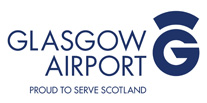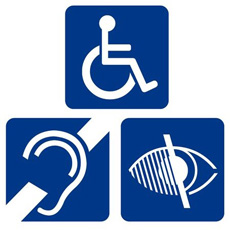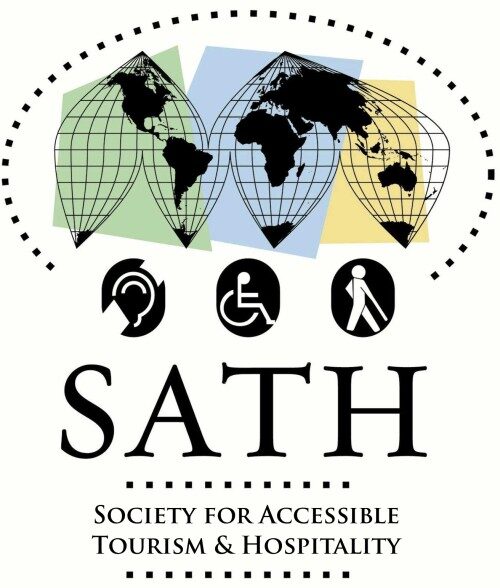
Air travel is one of the wonders of the modern age, and the advancement of cheaper air fares has opened up the world to ever more travellers. For most people the act of getting to the airport, parking and finding the correct terminal or booking-in desk is a fairly complex, slightly stressful but do-able task.
However, for disabled travellers there is an added complication, depending on the level and type of disability they have.
Information for Blue Badge Holders
The term ‘disability’ covers a wide spectrum of issues ranging from mild to severe, but regardless of the level and type of disability a person has, just getting to the airport and parking the car can be easier than you think providing you have the right information and the right help.
The first thing you need to know concerns the Blue Badge parking scheme. Whilst the scheme is a godsend in towns and cities it is not applicable to the roads in and around any UK airports. If you park on them, even whilst displaying your Blue Badge, your vehicle will be towed away and a big fine will be imposed for recovery of your vehicle – not the best end to your holiday.
Airports are very strict on security issues and on the need to keep traffic moving freely so be aware that there are no exceptions to this rule; not even if you are ‘only parking for a minute’ or dropping off or picking up. Drivers have received hefty fines for even slight parking infringements and you certainly don’t want to add a fine to the cost of your travel.
It’s also useful to know that if you need to park in a Blue Badge space but also need to take the badge abroad with you, contact the relevant airport parking service operator beforehand for advice. You may just need to show the badge to the car park attendant/operator/supervisor before exiting the car park. But make sure you check this before you go.
Specific UK Airport Disabled Car Parking Information
Birmingham Airport

Birmingham Airport has plenty of Blue Badge spaces in the short-term and long-term car parks with numerous accessible help points and with a total of 91 disabled bays across 6 car parks.
All car parks are suitable for passengers with reduced mobility but the Courtesy Bus offers wheelchair access from Car Park 5. Blue Badge holders are entitled to 60 minutes free parking within the Drop & Go Car Park but drivers must, prior to exit, visit the NCP Meet & Greet office to validate the Blue Badge and car park ticket.
Birmingham Airport uses OCS Ltd to provide assistance and services for disabled passengers and their contact details are as follows:
Telephone: 0121 767 7878 or email on: bhx.prm@ocs.co.uk
They ask that you pre-book special assistance needs with your airline or tour operator at least 48 hours before departure or arrival at the airport.
Manchester Airport

Blue Badge bays are available in all car parks but normal parking charges apply. There is a fully accessible shuttle bus service which runs to and from Long Stay and JetParks car parks.
Help button facilities are located at entrance and exit barriers and pay stations. The customer contact centre telephone number for general and car parking queries is 0330 333 0304.
Manchester Airport work with DisabledGo to assist with getting around the airport. The number for general enquiries is (+44) 0871 2710 711.
All contact centre phone lines are open from 9.00 am – 18.00 pm and they encourage travellers to check the frequently asked questions section on the website which is:
http://www.manchesterairport.co.uk/help-and-advice/contact-details.
London Gatwick Airport

Gatwick is especially good for disabled travellers. In both North and South terminals there are an excellent range of measures designed to assist disabled travellers but they recommend that you telephone your airline at least 48 hours before you fly to inform them of your specific requirements for when you are getting through the airport and for getting on the plane.
The telephone number for this is (+044) (0)844 892 0322 then select Option 2.
Located throughout the airport car parks and buildings are a number of general enquiry help desks plus dedicated PRM help desks, within the terminal buildings, for Persons with Reduced Mobility.
There are plenty of Blue Badge parking bays in the drop-off and Long-stay car parks. To obtain assistance from outside the terminal buildings you will find ‘gizmo booths’ where you can speak to a PRM assistant via a video link.
A charity called Travel-Care is located in The Village, South Terminal to offer help to anyone who needs it.
Gatwick Airport’s website holds a wealth of information. This is www.gatwick-airport-guide.co.uk/disabled-facilities.html.
Glasgow Airport

Glasgow has had good reviews from disabled travellers for its help services. Assistance is provided at both the Main Terminal and Terminal 2. They request that you telephone with your requirements at least 48 hours in advance of your departure, or ideally at the time of booking.
Assistance is given free of charge to and from all arrival points up to the departure gate, and for the return journey, to and from all car parks, drop-off points and bus stands. Help points are plentiful and situated all around the airport and there is a dedicated Special Assistance Desk within the Main Terminal check-in area.
The Glasgow Airport website recommends you download their handy PDF guide which gives extensive information and advice for travellers: www.glasgowairport.com/im-arriving/passenger-info
For all special assistance queries telephone 0141 842 7700 (24 hours)
Or email on GLA.PRM@ocs.co.uk
General Tips for Disabled Travellers

Before we look at individual airports and what they have to offer disabled travellers we thought we’d offer some generalised handy tips, for example regarding things you may need to think about before you travel, dependant on your level and type of disability.
1. Call Ahead. Give yourself plenty of time to make arrangements and if necessary obtain advice and instructions. Under EU law airports must provide every assistance for disabled passengers once inside the airport but things are sketchier outside.
When you call be specific about your requirements; whether you are in a wheelchair – or you need one to get through the airport; and if you are likely to need medical assistance. Do not assume the person you speak to will have a full understanding of your disability so make sure you explain everything clearly.
2. See your regular GP before you go to get their advice on how safe it is for you to travel in the first place and to arrange for any medication you will need to take, or to arrange for an emergency prescription if necessary. You may need to take a letter from your doctor outlining your medical requirements in case of emergency.
3. Bring extra medication with you; pack some in your case and some in your carry-on bag.
4. Wheelchair users in particular may not have considered the ramifications of either multiple connecting flights or long-haul flights which have tiny toilet cubicles! It may be worthwhile considering a specialist travel service with experience of arranging air travel for disabled travellers. Online company tryb4ufly.co.uk is one such organisation that can help.
You can find out much more about disabled access through UK airports by visiting out dedicated page – Help for disabled travellers through UK airports.
Whilst conducting our research on the subject of airport facilities for disabled travellers we have concluded that, as in everything, there are good and bad services and results can be variable, with larger airports sometimes struggling to fulfil their obligations and smaller airports less so.
EU Regulation 1107/2006 obliges all UK airports to provide assistance services to disabled travellers but even so some can still fall short on the personal touch.
Our advice would be to do your research before you go. Look for review sites like TripAdvisor or look for sites dedicated to disabled travellers. These can often be a goldmine of good advice. Telephone your airline provider in plenty of time before departure and keep in contact with them.
Don’t be afraid to telephone repeatedly to get the information and service you need. When you speak to the airline operators be assertive, be specific and clear in outlining what your disability entails and what your needs are. In addition to this, always take the name of the person you’re speaking to – it makes for better clarity if there’s any discrepancy between what you’ve been told and what is actually the case.
In short – CHECK – TELEPHONE – CONTACT – CLARITY!
Some airports still have some way to go to achieve that perfect service that all travellers – disabled or not – deserve, but it is clear that they are trying hard. If, however your experience is less than perfect, don’t be afraid to contact their customer complaints department.
It is only through customers pointing out what is going wrong that the airport service providers can start to put things right, and one complaint can go a long way in providing more accessibility and comfort for next time, or for your fellow travellers.
Have a good trip.
UKACP
Original article can be found here. Visit www.ukairportcarparks.co.uk for more information and they are the best Airport Car Parking Comparison Site

